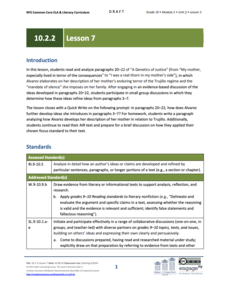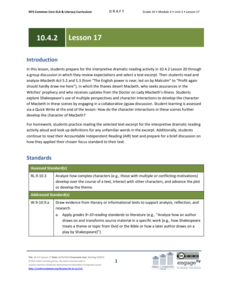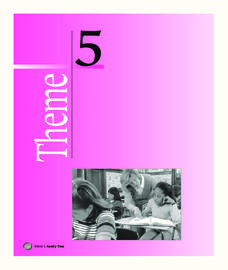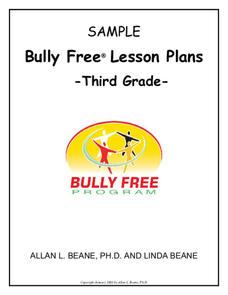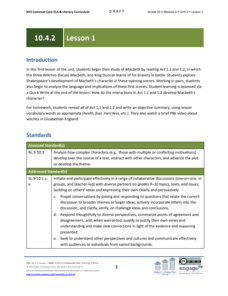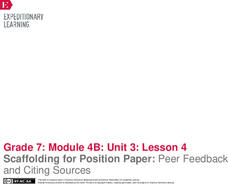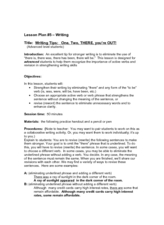Curated OER
Lesson: Unfolding Water Lilies
Comparing two different artistic mediums can be a welcome challenge. Learners compare Monet's The Water Lily Pond to three nature-inspired poems. They consider how each art form is interrelated, descriptive, and expressive. They then...
EngageNY
Grade 9 ELA Module 2, Unit 2, Lesson 10
The slow curse of realization begins to sink in during the tenth lesson in a literary analysis unit on Sophocles' Oedipus the King. Ninth graders carefully read the selected lines for evidence of Oedipus' feelings during a turning point...
EngageNY
Grade 10 ELA Module 2: Unit 1, Lesson 17
Scholars read the final paragraphs written by Martin Luther King Jr. in "Letter from Birmingham Jail." Readers work in groups to discuss King's word choice and point of view by completing graphic organizers. They also respond to a...
EngageNY
Grade 10 ELA Module 2: Unit 2, Lesson 7
"No flies fly into a closed mouth." Pupils consider the proverb's meaning as they read paragraphs 20–22 from the essay "A Genetics of Justice" by Julia Alvarez. They also engage in small-group discussions about how the author refines her...
EngageNY
Grade 10 ELA Module 2: Unit 2, Lesson 8
How do people's relationships with their parents impact their lives? Scholars read paragraphs 23–26 from "A Genetics of Justice" by Julia Alvarez, in which the author details her relationship with her mother. Pupils discuss how the...
EngageNY
Grade 10 ELA Module 4: Unit 3, Lesson 3
What's the difference between men and princes? Machiavelli discusses this distinction in chapter 18 of The Prince. Scholars first listen to a masterful reading of the chapter. Then, they write about how the author develops a central idea...
EngageNY
Grade 10 ELA Module 4: Unit 2, Lesson 17
Madness, violence, despair—the titular character of Shakespeare's Macbeth is spiraling out of control. Pupils first explore the topic with a collaborative jigsaw discussion. At the end of the instructional activity, they write about how...
EngageNY
Grade 11 ELA Module 1: Unit 2, Lesson 21
Rest in peace, Ophelia! Scholars read about Ophelia's burial in Act 5.1 of Shakespeare's Hamlet. They complete a Quick Write to analyze the characters' reactions to Ophelia's death.
EngageNY
Grade 11 ELA Module 1: Unit 2, Lesson 14
How do Ophelia's interactions with Hamlet help develop her character? Pupils continue reading Act 3.1 from Shakespeare's Hamlet. Using writing and discussion, scholars analyze the dialogue between Hamlet and Ophelia, paying particular...
EngageNY
Grade 11 ELA Module 1: Unit 2, Lesson 6
How does Shakespeare develop the characters of Laertes and Ophelia in Hamlet? Scholars complete a Quick Write to answer the question. They also continue reading and discussing the first act of the play.
EngageNY
Grade 9 ELA Module 1: Unit 3, Lesson 7
How does Shakespeare use dialogue to develop the idea that the star-crossed lovers are more concerned with their relationship as individuals than they are with their roles as children of warring families? That is the question facing...
Houghton Mifflin Harcourt
Family Time: English Language Development Lessons (Theme 5)
Support English language development with a family-themed unit consisting of a series of lessons designed to get your scholars moving, looking, speaking, writing, and listening. Conversation topics include birthdays, family...
Bully Free Systems
Bully Free Lesson Plans—Third Grade
Two lessons shed light on two types of bullying: verbal and cyberbullying. After defining the two types, scholars take part in whole-group discussions, complete worksheets, and write reflections. A parent or guardian chat encourages an...
Curated OER
Lesson: Cultural Comparisons
A game, research, and cross-cultural comparisons are in the works as you open an artistic lesson. Upper graders get analytical as they make observations that will help them create a link between abstract and creative thinking. They...
EngageNY
Grade 10 ELA Module 4: Unit 2, Lesson 1
What do readers discover about a character within the first few sections of a text? Pupils begin reading Shakespeare's Macbeth and analyze the language in the first few scenes of the play. They also demonstrate understanding with a Quick...
EngageNY
End of Unit 2 Assessment, Part 2: Revise Essay Drafts
One last chance to fix it. Writers work through a mini-lesson plan covering common errors found within their essays. They then receive their drafts with instructor feedback and adjust their essays one last time before handing it in for a...
EngageNY
Scaffolding for Position Paper: Peer Feedback and Citing Sources
It's all a process. Scholars watch as the teacher models a peer feedback process. They then carry out the process on their own using the Sustainable Water Management Peer Feedback Form. As a bonus, individuals then participate in an MLA...
Curated OER
Effective Writing is More Than a Five Paragraph Essay
Groups become experts in one aspect of the six traits of writing, prepare a PowerPoint presentation, jigsaw, and teach others about their trait. Writers then focus on these traits as they compose a persuasive essay about a person they...
Curated OER
Friendly Letters: Interactive Writing Project
Students practice writing friendly letters. In this friendly letters lesson, students take a field trip and then write a friendly thank you letter for the experience. Students follow the three given steps to complete the lesson.
Curated OER
The Writing Process
Introduce young writers to the writing process. Activities model the steps in the writing process (prewriting, drafting, revising, editing, polishing). A logic tree template is also included.
Curated OER
"Can Do!" Reading, Writing, and Understanding the Art of Technical Writing
Technical and informational writing is the most common type of writing that students will encounter. Using this SMART board activity, teach your 10th graders the four different types of technical writing. They can then practice following...
Curated OER
Lesson Plan 18: Cleaning It Up
Careful proofreading is an important step in the writing process. After guided practice using a provided worksheet that details common grammar concepts, young writers refer to the worksheet as they proofread their own work. Although the...
Curated OER
The Writing Tips: One, Two, There, You're Out!
Introduce your class to the importance of using active verbs in writing. Learners read sentences in which the word there is used, and identify an active verb that can be used instead. The lesson plan comes with a comprehensive worksheet...
Curated OER
Lesson Plan 10: Writing Really Good Dialogue
Boring dialogue can run a great story into the ground; get your novelists using dialogue as a tool to move their story into deeper and more developed territory. As part of a larger writing series, this lesson has a worksheet that can...
Other popular searches
- Thanksgiving Writing Lessons
- Expository Writing Lessons
- Descriptive Writing Lessons
- Creative Writing Lessons
- Persuasive Writing Lessons
- Essay Writing Lessons
- Paragraph Writing Lessons
- Interactive Writing Lessons
- Explanatory Writing Lessons
- Informative Writing Lessons
- Halloween Writing Lessons
- Free Esl Lessons Writing





